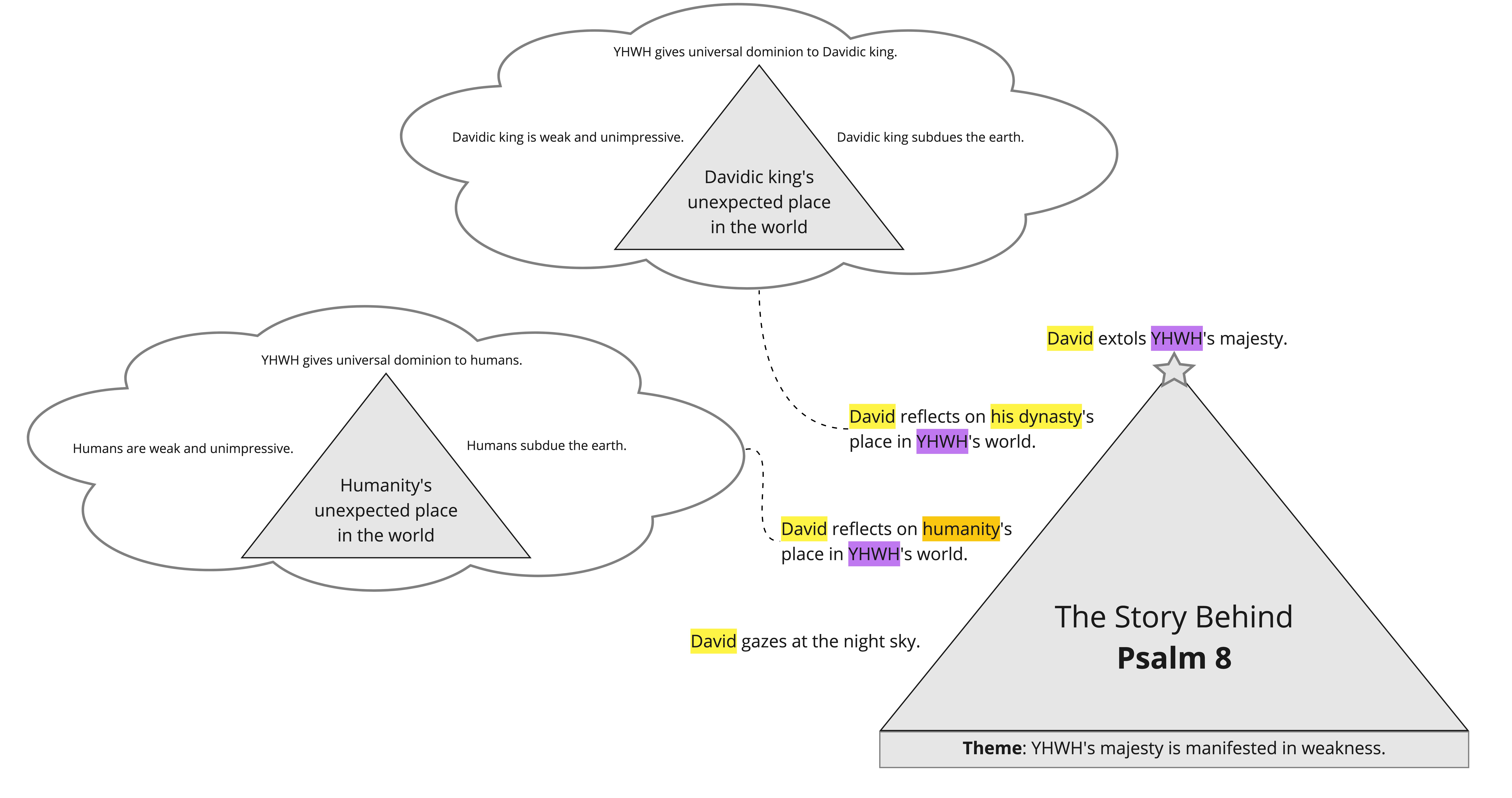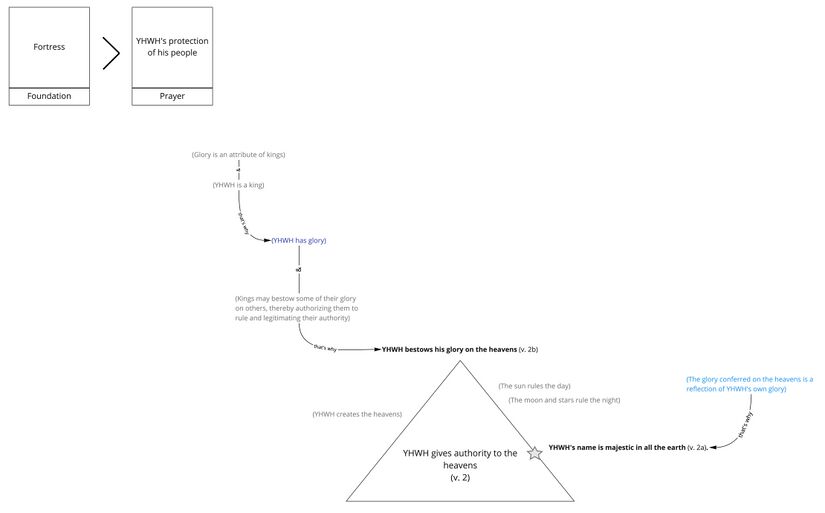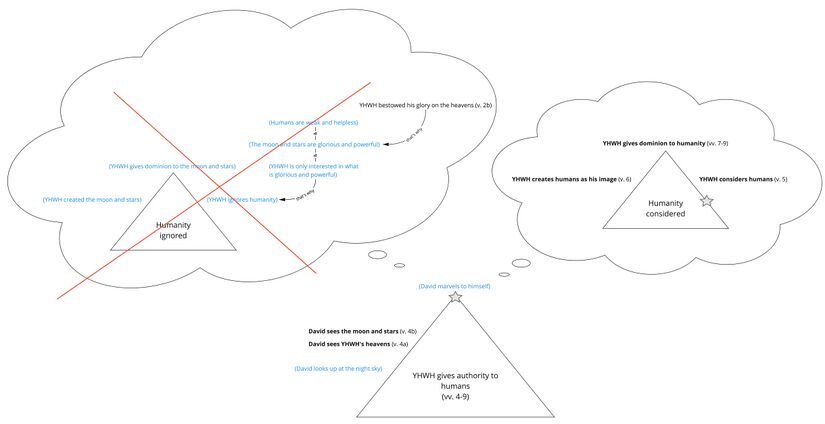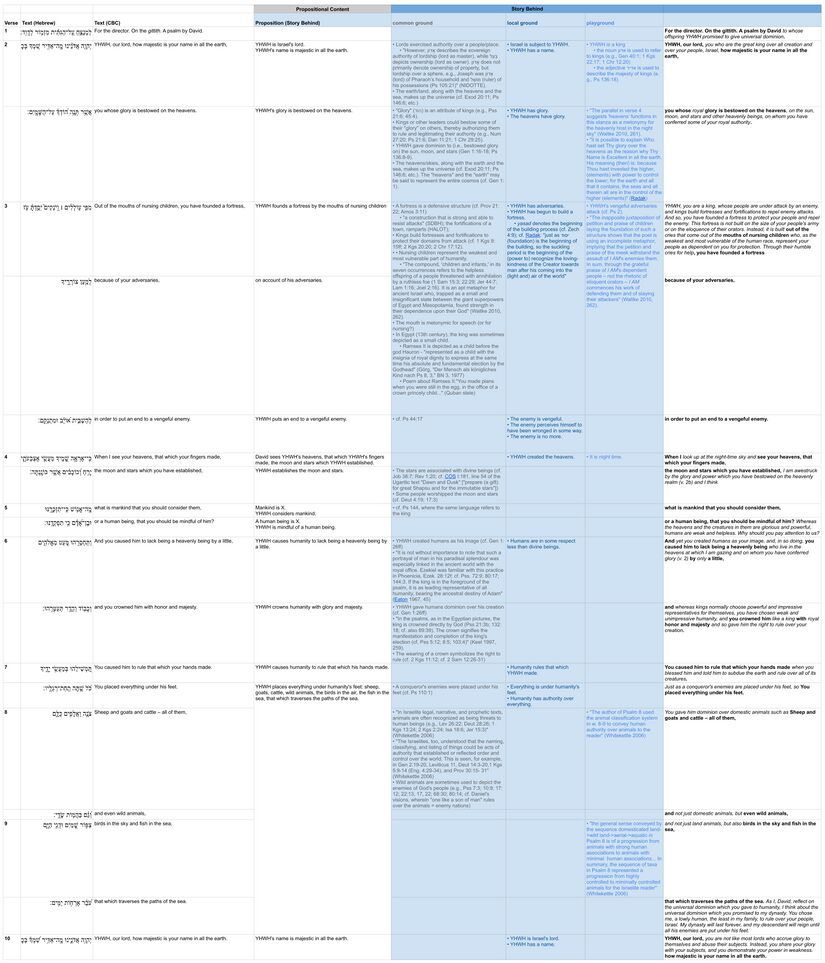Psalm 8 Story behind the Psalm
About the Story Behind Layer
The Story behind the Psalm shows how each part of the psalm fits together into a single coherent whole. Whereas most semantic analysis focuses on discrete parts of a text such as the meaning of a word or phrase, Story Behind the Psalm considers the meaning of larger units of discourse, including the entire psalm. (Click 'Expand' to the right for more information.)
The goal of this layer is to reconstruct and visualise a mental representation of the text as the earliest hearers/readers might have conceptualised it. We start by identifying the propositional content of each clause in the psalm, and then we identify relevant assumptions implied by each of the propositions. During this process, we also identify and analyse metaphorical language (“imagery”). Finally, we try to see how all of the propositions and assumptions fit together to form a coherent mental representation. The main tool we use for structuring the propositions and assumptions is a story triangle, which visualises the rise and fall of tension within a semantic unit. Although story triangles are traditionally used to analyse stories in the literary sense of the word, we use them at this layer to analyse “stories” in the cognitive sense of the word—i.e., a story as a sequence of propositions and assumptions that has tension.
Story Behind Visuals for Psalm 8
Summary Triangle
The story triangle below summarises the story of the whole psalm. We use the same colour scheme as in Participant Analysis. The star icon along the edge of the story-triangle indicates the point of the story in which the psalm itself (as a speech event) takes place. We also include a theme at the bottom of the story. The theme is the main message conveyed by the story-behind.

Background ideas
Following are the common-ground assumptionsCommon-ground assumptions include information shared by the speaker and hearers. In our analysis, we mainly use this category for Biblical/Ancient Near Eastern background. which are the most helpful for making sense of the psalm.
- The common practice of kings and lords is to accrue glory for themselves, not to bestow it upon others.
- YHWH gave dominion to (i.e., bestowed glory on) the sun, moon, and stars (Gen 1:16-18; Ps 136:8-9), which are associated with heavenly beings (cf. Job 38:7; Rev 1:20; cf. COS I:181).
- YHWH created humans as his image and gave them universal dominion (cf. Gen 1:26ff).
- YHWH promised to give David's dynasty universal dominion (cf. Pss 2; 72; 89; 110).
- "Portrayal of man in his paradisal splendor was especially linked in the ancient world with the royal office."[1]
- Wild animals are sometimes used to depict the enemies of God's people (e.g., Pss 7:3; 10:9; 17:12; 22:13, 17, 22; 80:14; cf. Dan 6-7).
Background situation
The background situation is the series of events leading up to the time in which the psalm is spoken. These are taken from the story triangle – whatever lies to the left of the star icon.

Expanded paraphrase
The expanded paraphrase seeks to capture the implicit information within the text and make it explicit for readers today. It is based on the CBC translation and uses italic text to provide the most salient background information, presuppositions, entailments, and inferences.
v.1
For the director, on the gittith, a psalm by David to whose offspring YHWH promised to give universal dominion.
v.2
YHWH, our lord, you who are the great king over all creation and over your people, Israel, how majestic is your name in all the earth, you whose royal glory is bestowed on the heavens, on the sun, moon, and stars and other heavenly beings, on whom you have conferred some of your royal authority.
v.3
YHWH, you are a king, whose people are under attack by an enemy, and kings build fortresses and fortifications to repel enemy attacks. And so, you have founded a fortress to protect your people and repel the enemy. This fortress is not built on the size of your people's army or on the eloquence of their orators. Instead, it is built out of the cries that come out of the mouths of nursing children who, as the weakest and most vulnerable of the human race, represent your people as dependent on you for protection. Through their humble cries for help, you have founded a fortress because of your adversaries, in order to put an end to a vengeful enemy.
v.4
When I look up at the night-time sky and see your heavens, that which your fingers made, the moon and stars which you have established, I am awestruck by the glory and power which you have bestowed on the heavenly realm [v. 2b] and I think.
v.5
"What is mankind that you should consider them, or a human being, that you should be mindful of him?" Whereas the heavens and the creatures in them are glorious and powerful, humans are weak and helpless. Why should you pay attention to us?
v.6
And yet you created humans as your image, and, in so doing, you caused him to lack being a heavenly being who live in the heavens at which I am gazing and on whom you have conferred glory [v. 2] by only a little, and whereas kings normally choose powerful and impressive representatives for themselves, you have chosen weak and unimpressive humanity, and you crowned him like a king with royal honor and majesty and so gave him the right to rule over your creation.
v.7
You caused him to rule that which your hands made when you blessed him and told him to subdue the earth and rule over all of its creatures. Just as a conqueror's enemies are placed under his feet, so You placed everything under his feet.
v.8
You gave him dominion over domestic animals such as Sheep and goats and cattle – all of them, and not just domestic animals, but even wild animals,
v.9
and not just land animals, but also birds in the sky and fish in the sea, that which traverses the paths of the sea.
As I, David, reflect on the universal dominion which you gave to humanity, I think about the universal dominion which you promised to my dynasty. You chose me, a lowly human, the least in my family, to rule over your people, Israel. My dynasty will last forever, and my descendant will reign until all his enemies are put under his feet.
v.10
YHWH, our lord, you are not like most lords who accrue glory to themselves and abuse their subjects. Instead, you share your glory with your subjects, and you demonstrate your power in weakness. how majestic is your name in all the earth.
Story Triangles
v.2
v.3
vv.4-9
Assumptions Table
Bibliography
- Eaton, John Herbert. 1967. Psalms: Introduction and Commentary. London: S.C.M. Press.
Footnotes
- ↑ Eaton 1967, 45.



